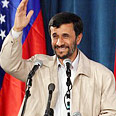
Iran refuses to suspend nuclear activity
Tehran offers new formula for solving crisis surrounding nuclear program, but in fact rejects incentive plan offered by western states, Fars news agency reported; US disappointed by Iranian reply
Earlier it was reported that Iran announced it was ready to enter serious negotiations on August 23 over its disputed nuclear program, but it failed to address the uranium enrichment issue.
According to the Fars report, Iranian officials estimate that after the world powers examine its reply, the threat to impose sanctions on the Islamic republic through the United Nations Security Council would be realized. Therefore the Iranians called on Europe to disengage from the American pressure and return to the negotiations table.
Alaeddin Broujerdi, who serves as head of the Iranian Parliament National Security and Foreign Policy Committee, called on Britain, France and German to address Iran's reply in a rational way without taking into consideration the American pressure.
According to Broujerdi, "they must choose the best possibility, which is negotiations."
Former Iranian Foreign Minister Ali Akbar Velayati, who serves as the advisor of spiritual leader Ayatollah Ali Khamenei for international issue, said that "the international pressure on Iran may increase, but that is an insignificant matter compared to our technological progress in the nuclear field."
According to him, "if one weighs the international pressure on the one hand and the long-term Iranian interest in nuclear energy for peace on the other hand, the result received is incomparable."
Velayati said: "The International community would oppose all our ambitions in the field of advanced technology. For example, if we develop biotechnologies they will charge against us that we want to develop biological weapons and if we focus on aircraft industry they will say we want to build a fighter jet. What's important for us is to acquire atomic energy and develop the necessary technologies."
He added: "It is forbidden for us to set Iran's national interests based on western demands because then we will become a passive country. It is forbidden for us to allow the negative atmosphere that is being created by the west to hinder our national ambitions because then they will find was to force things on us. Our nuclear issue is not for discussion on the international arena."
Broujerdi blamed European powers for the deadlock over Iran's nuclear issue: "At the beginning they mistakenly though that Iran doesn't intend on giving a clear and unequivocal answer by the deadline and therefore they worked out a resolution at the United Nations Security Council."
"This step was bad on their part and Iran will always remember that. Iran's response to the proposal was positive from day one. We wanted to inspect it and set up a team of experts for that purpose. More so, the president set in advance the exact day for a response and Iran showed it is genuine in its commitments towards the international community and the public opinion," he added.
US: Iran has 9 days
The American administration, as well as the other Security Council members, is carefully examining the Iranian statement and is in no rush to respond to it.
Sources in Washington stressed that Iran responded to the incentive package it was offered, but that this was not the Iranian reply to the Security Council's demand to immediately halt all the nuclear activity in general, and uranium enrichment in particular.
The Security Council's ultimatum is in force until August 31, and the Americans will not suffice with anything less than a suspension of the nuclear activity. The Iranians have only nine days left, officials in Washington stressed.
Iran is hoping that its unclear reply to the incentive package would split the United Nations Security Council over Washington's proposals for sanctions against the Islamic Republic with Russia and China opposing such move.
European capitals and White House have not officially responded to Iran's reply but sources in Washington accused Iran of trying to gain more time by presenting a vague response to the incentive package.
John Bolton, the US ambassador to the United Nations said this is a "significant moment" for Iran.
Bolton says the Iranians can either go down what he calls the "path of cooperation" – or they can risk sanctions.
Yitzhak Benhorin contributed to the report










